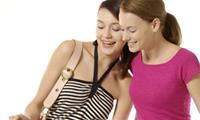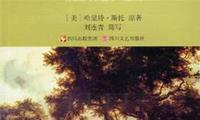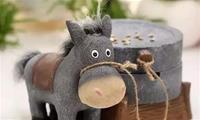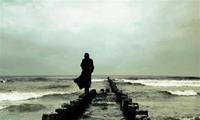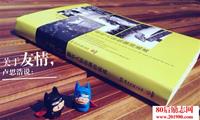野性的呼喚讀後感英文版
The Call of the Wild is London’s most-read book, and generally considered his best, the most masterpiece of his so-called “early period”。 The story was set in 19th-century Klondike Gold Rush, in which sled dogs were bought at generous prices.
Buck was a domestic dog in Judge Miller’s home and living a comfortable life until he was sold secretly by the poor gardener and became a sled dog. Buck was a Bernard dog weighed one hundred and forty pounds, tall, strong, and heavy muscled. He couldn’t accommodate to the harsh condition at first. And he wanted to fight, to escape, to go back to his cozy home, but in vain.
The man in red taught him the law of stick and club—one must first adjust himself to his surroundings and learn the rules, and only after that he can do what he wants to do. The club of the man in red called back Buck’s nature as a dog.
When he firstly served for Fran?ois and Perrault, two couriers, he showed his superior ability to adapt to the environment and his smartness to learn everything he wanted to learn. Curly’s death astonished him and taught him to be cautious. And before he had recovered from the shock caused by the tragic passing of Curly, he was harnessed as a sled dog and step by step wanted to be the leader. But the leading dog, Spitz, was already an excellent one, who also considered Buck as enemy and potential competitor. At last, when Spitz once punished him, hurling backward Buck, he knew the time had come. He killed Spitz and took his place.
When they pulled into Dawson, Buck was sold as useless thing to three gold diggers, who weren’t veteran in sledding and even didn’t know how to get to their destination. Food was eaten up half way. So Charles, one of the three, decided to kill Buck when he couldn’t get up. However, when he aimed at Buck, John Thornton sprang upon him, knocked him down and told him that if Charles stroke Buck, Thornton would kill him.
Thus, Thornton took Buck away. He was the only true friend of Buck. But Buck was a thing of the wild, especially when the calling of wolf from the hills. Once when he came back from hills, he found that Thornton was killed by Indians. What would you do if you were Buck when your beloved friend was killed? Buck became a nut and killed those headsmen and stayed with Thornton for two days and nights, never leaving Thornton out of his sight. And then a nearby wolf howl captures his ears, and he follows the sound to an approaching wolf pack, battling several of these creatures to prove his worth.
野性的呼喚英文讀後感
“When the long winter nights come on and the wolves follow their meat into the lower valleys, he may be seen running at the head of the back through the pale moonlight or glimmering borealis, leaping gigantic above his followers, his great throat a bellow as he sings a song of the younger world, which is the song of the pack.”
There was a script about the savage life in the frozen north of ice and snow. There were the unexplored north areas of America and the 19th-century Klondike Gold Rush which dragged men from the entire world into the hard wild to look for gold. There was a road where a gigantic dog like human fought his way to struggle in the wasteland. There was a civilized beast grew from mildness to wildness. And there came the call of the wild.
The background and plot
In the 19th century, it was said that gold had been found in the Klondike area in Northern California of vast wilderness, so thousands of people rushed into this uncultivated ground to seek for gold and fortune, which needed a large quantity of dogs to support for the transportation. There came up Buck story which we can’t define it as luckiness or unluckiness.
Buck, a dog weighed one hundred and forty pounds, tall, strong, and heavy muscled, lived a cozy and comfortable life in a rich family of a Judge named Miller, but was soled by evil gardener to two dog dealers and was took to Alaska as a sled dog.
Led by his second masters, two governmental couriers, he studied how to pull a sled and how to live in this cruel world where needed more cunning behavior and less fake moral and courtesy. For example, he learned to sleep in the snow hole to get warmness from the clod nights, and he learned to thief bacon and food from his masters and neighboring camps, as well as that, he learned how to fight effectively and efficiently with his antagonists and survive of the combat about the dominant leader with Spitz. In addition to those, he also went through the hardships in the toil on the ice layer, and he learned how to obtain the victory and stand on the wilderness which was beneficial to himself who can only fit the environment, but can’t defy the harness.
After the arduous trace and trail, they finally reached the destination, and then, after a short break, dogs including Buck led by a Scotch half-breed man stepped again on the ice land with the Salt Water Mail. It was a hard trip and a monotonous life operating like machine that dogs must undertake the heave pulling and poor condition where they were tired and short of weight. Buck’ partner, Dave who had something wrong inside suffered most of all, but pride as he was, pulling the sled was his holy missionary job which can fulfill his life and must be done until his death. However, the tough work was still continuous.
Thirty days passes, by which time Buck and his mates found how really tired and weak they are until they arrived at the last town. They were in a wretched state, worn out and worn out, which was not the tiredness that came from a brief and excessive effort and can be recovered from some hours’ rest, but was the dead tiredness that came through the slow and prolonged strength drainage of months of toil and had to need a long vocation to evacuate. Nevertheless, only three days after they were bought by a family including a foolish woman, a callow and ignorant youngster, and a middle aged man with weak and watery eyes. Never mind of dog’s frazzle, the third masters tried their best to lash out at them with whip, but Buck was not under very good command and not proud and interested of this career. Until they reached at the camp of Thornton, with the natural instinct and extreme weariness, Buck tolerated the whip from his so called masters and refused to go ahead which was his luckiness to meet his last master, Thornton.
Without doubt, Thornton was a good master, full of wisdom, intelligence and love who can manage Buck’s life comfortably and in order. By the careful attendance form his new master, Buck was on his feet quickly and solidly. Filled with the loying love toward his master, Buck companied him, saved his life for several times and helped him win the gambling party. Then, they faced into the East on an unknown trail to achieve where men and dogs as good as themselves has failed, as the call from the wild became stronger and stronger which attracted Buck to leave the civilization to look for. The knife that cut out the bound of Buck between his masters was the master’s deaths which left a void in the dog’s heart and a strengthened calling from the wild. Buck, a civilized dog, finally went back to wolves after thousands of generation by singing a song of the younger world, which is the song of the pack.
Survive of the fittest
The Call of the Wild abounded in Darwinism which advocated the evolutionism and natural selection theory.
In the process of having to leave the comfortable Miller’s house and adapt to the harsh primitive snowfield, Buck went through the changes from the mildness to wildness where he studied the law of club and fang and admitted the rule of failure without progress. “He had learned well the law of club and fang, and he never forewent an advantage or drew back from a foe he had started on the way to death.” “He must master or be mastered,” “Kill or be killed, eat or be eaten, was the law; and this mandate, down out of the depths of time, he obeyed.”
After analysis, we can find that related to the Darwinism, learning ability was an important factor of the victory of living of Buck. As a south dog living in the rich family and innocent environment, Buck was not wary of Manuel’s uncommon behavior, but situation has changed entirely after a period of barbaric life: he showed hostility to his all possible mates and took precaution of everything. As well as that, throwing away the moral standard and facing the death of starvation, Buck had an ability of thief. “This first theft marked Buck as fit to survive in the hostile Northland environment. It marked his adaptability, his capacity to adjust himself to changing conditions, the lack of which would have meat swift and terrible death.” In addition to those, his muscles became hard as iron, and he grew dumb to all ordinary pain, and he can successful take full use of all the elements no matter internal or external. That’s the progression of Buck which can equip him with thick helmets from being hurt deeply and made him be the fittest.
Not only did he learnt by experience, but instincts long dead became alive again. Maybe knowledge acquired by learning was Buck’s left hand, instincts his right. Good pedigree set up his first sense of a tall, strong and muscular potential king, while the instinct helped him to learn fast and save his life. “It was no task for him to learn to fight with cut and slash and the quick wolf snap.” “They came to him without effort or discovery, as though they had been his always.”
Buck changed as his living environment changed. With the change of environment, Buck, compared to the previous southern family dog that was mild and gentle, acquired many abilities and skills. He tried his best to live by becoming cunning, cold-blood, and cruel which make him step forward on the road of corpse and blood. Survive of the fittest which is demonstrated by adaptation to the environment and wielding the law to protect himself and attack on others made him roared on the top of the food chain and return to wolves.
All what Buck has done was not due to his reason and thought, but due to his fit. He was fit to everything surrounding him unconsciously and put him to the new way of living quickly.
“The theory, ‘Survival of the fittest’, is the law of biological evolution which implies that plants or animals adapt to the environment to survive or to die—it is the biological survival rule of brutal biosphere.” That is to say, the key of this law is that those who can fit the environment can survive, on the contrary, those failed to fit would be obsolete under the rule of elimination.
Peeping at Buck and his struggle, we can have a vision of us human that was also fighting in the battlefield with our mates and against our enemy. Filled with bustling stuff, we tried our best to stand on the top of right and authority only because that position would give us more materials and the sense of pride which we depended on to live. Flowers in the greenhouse didn’t know about the hardship of living, so they showed goodwill and send aroma to others; while life in the ice field where wind was blowing like knife and thick snow can bury people only showed a will of survive and cut up the useless goodness to wear on the coldness.
We must do it because we had to do it. The pack of animal was like a society of people. Death and genocide would happen on us if we were not willing to fit the environment thoroughly. To dance with the shackle of survive of the fittest was the policy we should carry out forever, the reason why our human stood on the top of biologic chain, and the rule of living of every individual.
My opinion on virtue and vice
Some people had said virtue was the biggest treasure that human should obey. There is no doubt that kindness, loyalty, honor, love, companionship, sympathy, mercy, and other virtue should be followed. However, I argue that there is transformation between different virtue and even the virtue and vice.
Showing the feature of three animals: dog, wolf and human, Buck was the bridge that connected the past and present. As the production of human civilization, dog was evolved from wolf and they would still howl on the wilderness if human didn’t raise and train them.
Buck was a mirror from which we can see ourselves. Through this dog, writer told us that only in a place where sun darted its forth beams and everything was in order human will wear the coat of basic goodness, otherwise, kindness would be eliminated if it met with the club and fang. In the cruel process of primitive accumulation of capitalism, mercy and sympathy was not needed for those quality can lead to death of innocent people. In the period of survive of the fittest, life was not concerned with civilization, while wilderness was the real marrow of life and echoing for the wilderness was the beginning of revival. Buck realized that “Mercy did not exist in the primordial life. It was misunderstood for fear, and such misunderstanding made for death.” This phenomenon can be seen in dogs as well as human. Wilderness were calling for human and eliminating the kindness in human’s heart stealthily.
In A Treatise of Human Nature, British philosopher David Hume has said moral came from human’s emotion and conscience but not rationality. The essence of moral existed in the perceptual knowledge, but not rational knowledge. Therefore, the reason why moral distinctions had the division of virtue and vice was that the judgment of moral came from human’s attitude toward their internal actions and external objects. The judgment of moral came from our interest appeal; that is to say, the judgment of moral came from what was good to us, but not what is good.
Let us think the question that which direction of Buck’s change to a beast was, progression or retrogression? The answer was that we can’t answer because he survived due to that he threw away those so called virtue and carry out those so called villainy. All what Buck did was under the pressure of living, and he responded to the call of the wild only because he wanted to live. Maybe in the comfortable and civilized Judge’s house, he would stick to the standard of moral and protect the respect of Judge’s riding whip by dying under his whip. But in this cold field, sticking to those so called moral was a fool. Possibly in this kind of world, brutality, cold-bloodedness, cunning and so on was the moral.
The division of virtue and vice was the refection of the division of civilization and wilderness to some degree. Maybe we can’t define what moral was and what vice was now in some scene, but we can try to last for enough time to seek for the answer.
Run after the free life
The call from the wild stood for human’s nature to run after a simple, independent and free life.
Buck was bored of the complex life where he must deal with such a big net of relationship. He just wanted to run and leap through the forest, howled under the grey moonlight, ate what he liked and killed what he liked without many rules to obey. No one desired to live a complicated life for it’s difficult and tiring to reckon other people, while life in the wilderness was just that eat or eaten, kill or killed and there was no middle ground. Easy and simple life was set up on the uncivilized world where creatures didn’t have so much relation and elements to consider. Only being independent from all that can we find what we wanted.
When unpracticed Charles and his relatives sunk in a ice hole, writer said that “A yawning hole was all that was to be seen.” That hole was a capitalistic vast mouth that can eat people, but which would be rotten if we escaped from it. “Here a yellow stream flows from rotted moose—hide sacks and sinks into the ground, with long grasses growing through it and vegetable mould overrunning it and hiding its yellow from the sun.” The gold that Thornton got has become a yellow stream because they were eroded by natural power and lost their value. Imagine in a world where was entirely natural and uncivilized, gold, a kind of iron and currency, was entirely futile, isn’t it?
Being free of human world and even free of materials, Buck got a totally new life where he can run at the head of the pack through the pale moonlight to release his vitality and got comfort from nature. We needed materials actually, but material was void actually. How can we get free? To get free of our hearts.
Conclusion
There are two sentences I’d like to mention. First, human beings, never degenerate into beasts. Second, beasts, never degenerate into human beings. Correctness of those two sentences should be discussed.
Human’s progression began in the point when human beings evolved from wilderness period to civilization, but the retrogression also began at the point when people shared the feast of civilization. For us who are far away from the wilderness and raised and trained by civilization, this book gives us a new vision.
Sometimes a picture floating in my mind: in the icy forest, a silhouette of Buck as a wolf caned his neck to howl toward the pale moonlight to echo the howling of pack. That’s the song of animal, and the chant of human, and the snarl of life.
企業無小事讀後感(一)
今年我集團公司開展的“讀書活動”中,我選讀的是《企業無小事》這本書。
本書闡述了一個簡單但力量強大的個人與組織成功理念:你說的每句話、每個想法、做的每件事都有一個方向。而在你追求卓越的道路上,這個方向會成為你的推動器或絆腳石。不論大小或目的,每件事都會產生最基本的影響。
可是有太多的組織和個人因為對小事情的冷淡忽略,都以一種平庸的沉悶狀態運行著。那種“不要為小事抓狂”的流行哲學毒害甚深,
工作就像一場棋藝比賽,每一步都很重要,每個決策都會造成後果,一步走錯可能滿盤皆輸。每一步都要重視!每件事都重要!
這本書從多方面告訴我們,每一件小事都很重要,都可能影響到我們的工作成績,環環相扣,甚至最終影響到企業的發展和存亡。下面結合工作淺談一下我的讀書感想。
工作無小事。天下大事,必做於細。我們目前工作的目的就是要把工程幹好、要為公司創造利潤、為員工創造利益、要讓我們的企業獲得不斷的發展。可是最宏大工程的成敗也是由最小組成部分的成敗來決定的,
管理無小事,推動精細化管理。在我們生產單位中,最重要的是前方生產,這是公認的,前方生產固然重要,因為幹得好壞,直接反應我們的實力,我們企業的品牌。然而在這背後,究竟有多少管理工作是需要我們去做的,去重視的。生產是需要管理推動的,或許一個管理的錯誤就導致了工程返工、停工。這個規則同樣延伸到到領導與下屬、管理者與作業者得相互關係,或許你一個錯誤的指示或者判斷,
我們幾年前開始大力推行專案管理,衝破陳舊的管理體制,大膽的走新路。我公司經過幾年來的實踐和不斷總結、改進,管理制度日漸完善,但是執行上又如何呢,往往制度寫的是好的,但是真正實施起來的時候,困難重重,總是因為客觀的或人為的關係,執行不下去,或者跟原來的目標有所偏離,比如抓成本抓了很多年,可是因為現在合同單價低、業主不斷的縮短工期、再加上管理本身也存在一定問題的情況下,
團隊精神、齊心協力才能創造輝煌的成就。一個企業要發展壯大,必然要有它自己的企業文化、企業精神,而且是要有魅力的企業文化,這樣才能有凝聚力,這就是在突出團隊精神的重要性,不管是一個大的企業還是一個小的公司,如果沒有優秀的團隊精神,那麼它就不可能走的壯大、走的堅挺。從小我們都明白一個道理,幾乎每個孩童都知道:一根筷子一下子就折斷了,可是一把筷子都折不斷!、眾人拾柴火焰高……看起來淺顯的道理,
創新是佔領市場、開拓市場的核心。在日異月新變化的現狀中,需要不斷的創新。書中寫道:“戰略的精髓在於創造適用未來的競爭優勢,並且這種創造要比那些模仿當今競爭優勢的人快得多,要始終做到這一點,必須信奉創新是核心,每個人和每份工作的核心競爭力不同,但是我們都需要把握創新。”如果我們只是不斷重複歷史,只是不斷反復以往的經驗,怎麼跟得上時代的腳步,跟得上科技的發展?佔有市場,挖掘商機、創造未來,都離不開創新。無論是在技術、生產、管理中,創新都很重要,傳統的企業很多時候面臨著一個現狀:依賴現有的方法解決問題,這種局面必須改變,因為只有比競爭對手多創新,才能比競爭對手成長的更快。一個企業創新和不斷適應的能力會決定比較中的勝負。我們必須從歷史中找出可取的經驗、應吸取的教訓,讓下一步走的更好。
我們集團公司已經很重視這方面的工作,幾年來不斷的鼓勵發展科技創新,重金獎勵發表科技成果、專利的人員。這也是一件持久的工作,創新與卓越很相似,做一次雖然有困難,但還可以做到,但持續做下去,則是相當困難,究竟是真正的卓越或是曇花一現,不斷創新就是先決條件。擴大來講,不僅僅是在科學技術上要創新,管理辦法、思維同樣也需要不斷創新,與時代接軌,甚至要用戰略的眼光走在時代的前端,那麼成功才能始終把握在手中。所以我們要找出,哪裡需要創新?哪裡還可以創新?為了使我們已有的工作更有成效,還要做出哪些努力?等等問題,是我們每個人都應時常思考的問題,每個員工要思考,作為領導更應該思考。
這本書講述的還很多,以上談的只是幾個方面較為淺顯的看法。這本書讓我瞭解到,作為一個公司的管理者,必須要認真對待工作中的每一件小事,要有戰略的眼光,要有計劃、有膽略、有創新,在貫徹公司的管理制度上,要不斷的總結經驗。精細化管理不是一句空話,必須落實到實處。
作為一名領導,對企業要忠誠、顧全大局,作為表率,為下屬帶好頭,要具有協調力,協調好公司運作中的各個環節的工作,同時在自身方面,要謙遜、耐心、要有敢抓敢幹的勇氣,同時也要有貴在堅持的理念,充分發揮領導力,激發和維持良好的團體精神,共同創造佳績。
我還有一些方面做的不夠,今後我會更加注重個人素質的培養,從自身做起,從小事做起,不忽略身邊的任何細節。一本好書,僅僅讀過是不夠的,需要讀懂、讀懂之後還要學會運用;今後還要繼續學習,因為只有不斷的學習,才能有更多的掌握,有更多的創新。
企業無小事讀後感(二)
在人們的潛意識裡,對自己將要做的事情做一個值得或是不值得的評價,已經成為了一種習慣。人們潛意識裡認為不值得做的事情就不會努力做好,甚至乾脆就不去做。我們看到,在工作中,太多的人將目光投在能夠滿足虛榮心或是能夠出人頭地的大事情上面,認為工作中的許多具體事情是不值得做的小事情。其實,在日常工作中,幾乎都是一些小事,不去做好小事,往往是人們失敗的主要原因。
對每個人來說,工作應該是義不容辭的責任,而不是負擔。我們每個人除了要認真對待工作之外,還要注重細節。把工作做到完美,以最高的認同感和滿意度來要求自己,這就要注重細節,注重工作中的小事情。把小事當回事去做,體現了一個人對工作的認真態度。盡職盡責地完成工作,重視工作中的小事與細節,這不僅是工作的原則,也是人生的原則。一件簡單的小事情,所反映出來的是一個人的責任心。做好工作中的小事,才是真正堪負“大責任”的人。工作不是被迫去做的苦役,在工作中投入熱情,我們會發現,其中蘊涵著極大的樂趣。把工作當成苦役的人,只能永遠做別人分配的工作,卻未必能把分配到的事情做好。而考慮到細節、注重小節,把工作當作樂事去做的人,將小事做細緻,()不僅能學習到知識,而且必將在做小事中發現機會,最終走上成功之路。
無論做哪種工作,不注重細節,忽視小節,都會給單位及個人帶來負面的影響,甚至造成損失。嚴謹的工作態度是做好小事的前提。
很多時候,一件看來微不足道的小事,卻能改變人和命運。工作中無小事,這首先要求我們極具責任心,不放過每一個細節,認真去對待它、完成它。有的人不願去做小事,只想成就大事,因此做事很浮躁。只有端正心態,去除貪做大事的心理,把小事做到位,才能提高工作品質。讓重視小事成為我們的一種習慣,那麼,也就培養了我們的責任感,從而與優秀、成功同行,最終成就大業。
我想告訴每一位工作中的人,不僅要努力工作,還要認真對待工作中看來微不足道的小事,從工作細節中學習知識,要知道並瞭解工作中沒有真正的小事可言。
企業無小事讀後感(三)
每個行業,都有自己的行業特色。每個企業,都有自己的企業文化。每個人,都在工作中有自己的崗位,在生活中扮演自己的角色。沒有人希望庸庸碌碌,得過且過的了此餘生。然而,當我們對一些平凡瑣碎的工作缺少熱情,敷衍了事,當我們開始為自己的默默無聞而自怨自艾,怨天尤人時,我們是否想過是什麼阻礙了我們的發展?是什麼讓機會從我們身邊溜走?
讀了《工作中無小事》這本書,讓我深有感悟。它告訴我們要做一個優秀的員工就要“即使是小事也要做到最好”,要“拒絕浮躁,做事不貪大”,要明白“工作中無小事”,“把每一件簡單的事做好就是不簡單”。
我想,沒有人願意在電閃雷鳴的夜晚,從溫暖的被窩裡出來,去基站檢查和搶修;沒有人願意在風和日麗的節假日,放棄和家人的團聚,而堅守在運行設備前;沒有人願意在緊張忙碌的辛勞後,仍然加班加點,繼續為客戶提供滿意的服務;然而,我們選擇了移動通信這個行業,我們就必須接受它的全部,不僅僅只是享受它帶來的利益與快樂,也應該包括辛勞和危險。它特殊的工作要求決定了我們必須這樣做,而且必須做好。我們必須認認真真,踏踏實實地去完成每一項工作,重視每一件小事。因為我們知道,哪怕是小到客戶的一句諮詢,小到客戶經理言行舉止的一個細節,在移動通信行業都是不容忽視的。在客戶服務中,一句客戶諮詢得到不滿意不耐心的回復,會讓客戶產生轉網的念頭。客戶經理一個粗鄙的動作,會讓你失去一次行銷的機會。
移動通信這個特殊的行業,它要求我們在網路建設維護中,在為客戶提供服務中,沒有任何條件可以談,也沒有任何抱怨的理由和藉口,要秉承“追求客戶滿意服務”的服務宗旨。它要求我們在工作中要對自己的言行負責,對同事的言行負責,對整個移動用戶群負責。它要求我們無論在任何時間、任何地點、任何情況下,都要全力以赴地在最短的時間內處理好各種投訴。
成功不是偶然的,有些看起來很偶然的成功,實際上我們看到的只是表像。正是對一些小事情的處理方式,已經昭示了成功的必然。小事如此,大事亦然。“工作中無小事”所體現的正是這種要求人們必須具備一種鍥而不捨的精神,一種堅持到底的信念,一種腳踏實地務實態度,一種自動自發的責任心,一種全力以赴的執行力。所以,工作中無小事,應該是每個移動人所應該具備的行業素質。
只是不斷反復以往的經驗,怎麼跟得上時代的腳步,跟得上科技的發展?佔有市場,挖掘商機、創造未來,都離不開創新。無論是在技術、生產、管理中,創新都很重要,傳統的企業很多時候面臨著一個現狀:依賴現有的方法解決問題,這種局面必須改變,因為只有比競爭對手多創新,才能比競爭對手成長的更快。一個企業創新和不斷適應的能力會決定比較中的勝負。我們必須從歷史中找出可取的經驗、應吸取的教訓,讓下一步走的更好。我們集團公司已經很重視這方面的工作,幾年來不斷的鼓勵發展科技創新,重金獎勵發表科技成果、專利的人員。這也是一件持久的工作,創新與卓越很相似,做一次雖然有困難,但還可以做到,但持續做下去,則是相當困難,究竟是真正的卓越或是曇花一現,不斷創新就是先決條件。擴大來講,不僅僅是在科學技術上要創新,管理辦法、思維同樣也需要不斷創新,與時代接軌,甚至要用戰略的眼光走在時代的前端,那麼成功才能始終把握在手中。所以我們要找出,哪裡需要創新?哪裡還可以創新?為了使我們已有的工作更有成效,還要做出哪些努力?等等問題,是我們每個人都應時常思考的問題,每個員工要思考,作為領導更應該思考。
這本書講述的還很多,以上談的只是幾個方面較為淺顯的看法。這本書讓我瞭解到,作為一個公司的管理者,必須要認真對待工作中的每一件小事,要有戰略的眼光,要有計劃、有膽略、有創新,在貫徹公司的管理制度上,要不斷的總結經驗。精細化管理不是一句空話,必須落實到實處。
作為一名領導,對企業要忠誠、顧全大局,作為表率,為下屬帶好頭,要具有協調力,協調好公司運作中的各個環節的工作,同時在自身方面,要謙遜、耐心、要有敢抓敢幹的勇氣,同時也要有貴在堅持的理念,充分發揮領導力,激發和維持良好的團體精神,共同創造佳績。
我還有一些方面做的不夠,今後我會更加注重個人素質的培養,從自身做起,從小事做起,不忽略身邊的任何細節。一本好書,僅僅讀過是不夠的,需要讀懂、讀懂之後還要學會運用;今後還要繼續學習,因為只有不斷的學習,才能有更多的掌握,有更多的創新。
企業無小事讀後感(二)
在人們的潛意識裡,對自己將要做的事情做一個值得或是不值得的評價,已經成為了一種習慣。人們潛意識裡認為不值得做的事情就不會努力做好,甚至乾脆就不去做。我們看到,在工作中,太多的人將目光投在能夠滿足虛榮心或是能夠出人頭地的大事情上面,認為工作中的許多具體事情是不值得做的小事情。其實,在日常工作中,幾乎都是一些小事,不去做好小事,往往是人們失敗的主要原因。
對每個人來說,工作應該是義不容辭的責任,而不是負擔。我們每個人除了要認真對待工作之外,還要注重細節。把工作做到完美,以最高的認同感和滿意度來要求自己,這就要注重細節,注重工作中的小事情。把小事當回事去做,體現了一個人對工作的認真態度。盡職盡責地完成工作,重視工作中的小事與細節,這不僅是工作的原則,也是人生的原則。一件簡單的小事情,所反映出來的是一個人的責任心。做好工作中的小事,才是真正堪負“大責任”的人。工作不是被迫去做的苦役,在工作中投入熱情,我們會發現,其中蘊涵著極大的樂趣。把工作當成苦役的人,只能永遠做別人分配的工作,卻未必能把分配到的事情做好。而考慮到細節、注重小節,把工作當作樂事去做的人,將小事做細緻,()不僅能學習到知識,而且必將在做小事中發現機會,最終走上成功之路。
無論做哪種工作,不注重細節,忽視小節,都會給單位及個人帶來負面的影響,甚至造成損失。嚴謹的工作態度是做好小事的前提。
很多時候,一件看來微不足道的小事,卻能改變人和命運。工作中無小事,這首先要求我們極具責任心,不放過每一個細節,認真去對待它、完成它。有的人不願去做小事,只想成就大事,因此做事很浮躁。只有端正心態,去除貪做大事的心理,把小事做到位,才能提高工作品質。讓重視小事成為我們的一種習慣,那麼,也就培養了我們的責任感,從而與優秀、成功同行,最終成就大業。
我想告訴每一位工作中的人,不僅要努力工作,還要認真對待工作中看來微不足道的小事,從工作細節中學習知識,要知道並瞭解工作中沒有真正的小事可言。
企業無小事讀後感(三)
每個行業,都有自己的行業特色。每個企業,都有自己的企業文化。每個人,都在工作中有自己的崗位,在生活中扮演自己的角色。沒有人希望庸庸碌碌,得過且過的了此餘生。然而,當我們對一些平凡瑣碎的工作缺少熱情,敷衍了事,當我們開始為自己的默默無聞而自怨自艾,怨天尤人時,我們是否想過是什麼阻礙了我們的發展?是什麼讓機會從我們身邊溜走?
讀了《工作中無小事》這本書,讓我深有感悟。它告訴我們要做一個優秀的員工就要“即使是小事也要做到最好”,要“拒絕浮躁,做事不貪大”,要明白“工作中無小事”,“把每一件簡單的事做好就是不簡單”。
我想,沒有人願意在電閃雷鳴的夜晚,從溫暖的被窩裡出來,去基站檢查和搶修;沒有人願意在風和日麗的節假日,放棄和家人的團聚,而堅守在運行設備前;沒有人願意在緊張忙碌的辛勞後,仍然加班加點,繼續為客戶提供滿意的服務;然而,我們選擇了移動通信這個行業,我們就必須接受它的全部,不僅僅只是享受它帶來的利益與快樂,也應該包括辛勞和危險。它特殊的工作要求決定了我們必須這樣做,而且必須做好。我們必須認認真真,踏踏實實地去完成每一項工作,重視每一件小事。因為我們知道,哪怕是小到客戶的一句諮詢,小到客戶經理言行舉止的一個細節,在移動通信行業都是不容忽視的。在客戶服務中,一句客戶諮詢得到不滿意不耐心的回復,會讓客戶產生轉網的念頭。客戶經理一個粗鄙的動作,會讓你失去一次行銷的機會。
移動通信這個特殊的行業,它要求我們在網路建設維護中,在為客戶提供服務中,沒有任何條件可以談,也沒有任何抱怨的理由和藉口,要秉承“追求客戶滿意服務”的服務宗旨。它要求我們在工作中要對自己的言行負責,對同事的言行負責,對整個移動用戶群負責。它要求我們無論在任何時間、任何地點、任何情況下,都要全力以赴地在最短的時間內處理好各種投訴。
成功不是偶然的,有些看起來很偶然的成功,實際上我們看到的只是表像。正是對一些小事情的處理方式,已經昭示了成功的必然。小事如此,大事亦然。“工作中無小事”所體現的正是這種要求人們必須具備一種鍥而不捨的精神,一種堅持到底的信念,一種腳踏實地務實態度,一種自動自發的責任心,一種全力以赴的執行力。所以,工作中無小事,應該是每個移動人所應該具備的行業素質。
